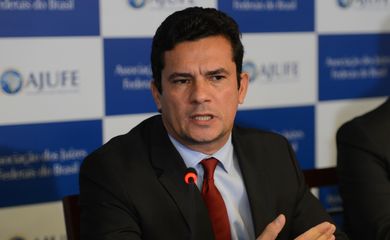Judge Moro: Plea bargain not only method used in Car Wash investigations




Judge Sergio Moro, responsible for the Operation Car Wash procedures.
Judge Sergio Moro, responsible for the Operation Car Wash procedures in a court of first instance in Curitiba, in Paraná state, responded to critics of the operation, saying that the plea bargain deal is not the only method used by the investigation. According to him, when foreign currency dealer Alberto Youssef was arrested, they already had evidence and his plea bargain was just the "icing on the cake."
When the currency dealer was arrested, they had uncovered the scheme involving kickback payments on contracts with the Brazilian state-led oil company Petrobras.
Moro attended the 5th National Forum on Criminal Justice today (Oct. 4), in São Paulo. Outside the hotel where the event was held, a small group protested expressing their support to the judge.
In the judge's view, plea bargain deals “have to be made according to rules, with care and caution. Never trust a criminal,” he said. The judge said it is necessary to estimate whether it is worth or not to close a deal with the informer. "Because it also has a cost, since the informer will receive proportionate criminal sanctions," said Sergio Moro.
In a speech to federal judges, Moro said he would only comment on cases already tried by the Operation Car Wash. According to him, a Petrobras executive manager, who received bribes, has returned $98 million embezzled to secret accounts abroad.
Systemic corruption
Moro pointed out that he found "systemic corruption" in Petrobras. "Systemic corruption as something widespread, pervasive, and deep, which is not very common," he said. The judge noted that the practice in the oil company was to pay bribes between 1% and 3% of the value of contracts.
The judge said that the percentage may not be considered significant, but on works contracts, refinery equipment, and acquisition of drillships, the values may reach $310 million. "This bribe was not only earmarked to Petrobras, part of it would go to politicians and parties, which would give support to Petrobras agents to remain in offices," he added.
Translated by Amarílis Anchieta
Fonte: Judge Moro: plea bargain not only method used in Car Wash investigations


